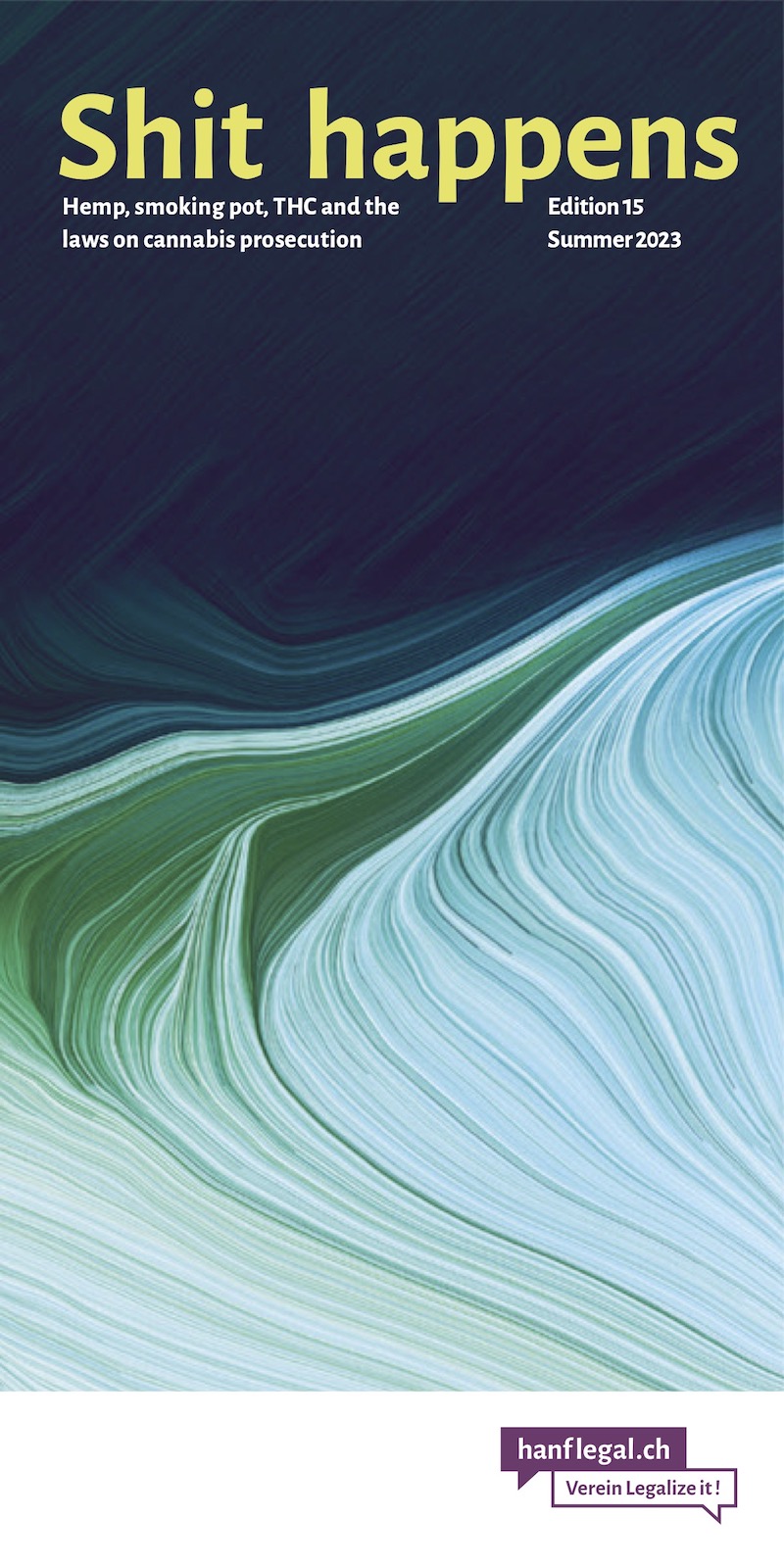- THC & Law:
Autumn 2008: Arguments for the hemp initiative
Now you can still convince relatives, write letters to the editor, work with neighbors, change the minds of colleagues or even start a discussion with people on the street. A few arguments for that. After November 30, it is then run
The two core messages, the central messages for the hemp initiative, are:
- The hemp initiative creates order, puts an end to arbitrary law, sets clear guard rails and enables preventive action and early intervention.
- The hemp initiative abolishes a superfluous ban that achieves nothing, costs a lot and pumps a billion into the illegal market every year - and deprives the state of hundreds of millions of taxpayers' money.
Now follow active arguments, then answers to some of the most common questions about THC use.
The cannabis problem is (still) big and urgent!
Even if public visibility has decreased in recent years and the latest statistics suggest a stabilization of the consumption rate at a high level: Cannabis is and remains the most widely used illicit drug in Switzerland. 28 percent of the Swiss population aged 15 to 39 have smoked pot at some time. Almost every second young person between 16 and 20 in Vaud or Zurich smokes pot at least once a month.
Today's prohibition policies are failing!
We have a law that prohibits cannabis in general, but that…
- cannot be implemented
- is handled differently from canton to canton
- creates a great deal of legal uncertainty
- undermines the credibility of the rule of law
- Tying up resources in repressive rather than preventive measures
- and quite obviously cannot effectively curb the spread of cannabis!
In any other area, such an obviously ineffectual policy would be changed. Ideological blinkers prevent this in the area of cannabis policy. Switzerland continues to invest in the most expensive and ineffective measures.
Today's cannabis policies are harmful!
Cannabis prohibition harms users more than cannabis itself:
- The prohibition of cannabis makes it impossible to control the products consumed. Consumers are completely unprotected. They lack information about what they consume.
- The THC content is not controllable.
- Toxic pesticides are inhaled as well.
- Admixtures such as glass splinters and lead pellets are a hazard to consumers.
- The markets for cannabis, cocaine and heroin are mixing (and while cannabis prices are rising, cocaine prices are falling…).
The biggest interest in cannabis prohibition is the mafia!
- Cannabis prohibition makes cannabis trafficking a lucrative field of activity for drug dealers.
- The black market is flourishing and developing in a completely undesirable direction: instead of local producers and dealers, international criminal networks increasingly dominate the cannabis market.
- Cannabis prohibition pumps a thousand million francs into the underworld every year - and deprives the state of hundreds of millions in tax revenue francs.
Cannabis prohibition hinders prevention and youth protection!
- Prohibition policies prevent adolescents or adult problem users from talking openly about problems without fear of sanctions
- The prohibition policy leads to cannabis use being hidden. This prevents early detection and increases the risk of chronic use.
A sober cannabis policy achieves its goals!
- It enables control.
- It leads to later first use (18 years and older).
- It reduces the harmfulness of the products consumed.
- It identifies young people at risk at an early stage and intervenes in a manner appropriate to the target group.
A sober cannabis policy invests in prevention and youth protection!
More than 30,000 cannabis-related convictions per year cause an enormous administrative burden and produce unnecessary costs in the millions. This money is missing for prevention and counseling.
A sober cannabis policy relies on personal responsibility! The state must not dictate to adults what they should and should not consume. But it must inform them about the risks and have a regulating effect. Therefore, cannabis consumption by adults must be exempt from punishment, as long as third parties are not harmed by it (protection of passive smokers).
A sober cannabis policy sets limits!
- Young people need close support that sets limits and strengthens resources. And they need prospects (professional development, recognition).
- A cannabis policy with a sense of proportion sends a clear normative signal: we don't want minors to smoke pot. Anyone who crosses this line must seek help.
- The professional community has developed demonstrably effective programs and services for cannabis-using youth (and adults) in recent years.
A sober cannabis policy creates order!
- There needs to be a clearly regulated market for cannabis trade. The black market is everywhere, but the controlled cannabis trade is only where you want it!
- A clearly regulated market allows control of trade and product quality.
- The black market privatizes the profits and passes the costs on to the general public. Only a regulated market allows clear taxation, which pays for prevention, counseling and social follow-up costs.
Stoners cause accidents?
If you smoke pot, you don't drive! A law on this is in place: “Driving under drugs” is a misdemeanor, the limit is practically zero.
Smoking pot makes you lethargic, reduces performance, causes school problems?
Psychosocial problems are more often responsible for cannabis use than vice versa. Many studies have explored the question of whether cannabis use affects adolescent performance and motivation. A new Swiss study shows that adolescents who use only cannabis function better socially than those who also smoke cigarettes. Compared with abstainers, they do not have psychosocial problems more often.
Mental health problems triggered by cannabis use?
Cannabis use may accelerate the development of mental illness and adversely affect its cure. However, whether cannabis is causally responsible for mental illness remains unclear.
Cannabis use triggers schizophrenia?
Medically proven, approximately 1.5% of the population is born with schizophrenia. Although smoking pot has increased, the number of mental illnesses in the area of schizophrenia has remained the same. There is no proven causality between illness as well as disease progression and smoking pot. Many patients also report that THC helps them, so they use it as a medicine.
The control of cultivation and trade costs excessive?
The costs caused by repression are reduced - the police can take care of real problem cases. Every report causes police officers and judges to be busy. Estimates put the cost of repression at up to one billion francs per year.
Smoking pot damages the respiratory organs?
It is not cannabis (THC) that is primarily responsible for this, but smoking itself. Frequent cannabis smoking can lead to a whole host of lung damage such as chronic bronchitis and airway inflammation. Vaporizing and eating are good alternatives here.
Smoking pot irreversibly damages the brain?
Being stoned impairs the brain's performance. However, smoking pot does not irreversibly damage the brain. Smoking pot affects brain performance in the short term, but no permanent damage can be detected. THC causes perceptual changes at the time of use. It impairs reaction time and short-term memory. It is clear that people under the influence of THC should not drive a vehicle. However, the age of onset seems relevant. Long-term users who started using cannabis before the age of 17 performed worse in the test results than those who started later.
Too high THC content promotes addiction?
The relationship between THC and danger is not proportional - unlike with alcohol. There are contradictory studies and statements on the effects of an increased THC content. With the initiative, the control of the THC content is possible through clear product declaration.
Cannabis legalization leads to drug tourism?
A clever dispensary model (a kind of credit card) makes it possible for the purchase of cannabis free of punishment to be linked to certain conditions (for example, residence in Switzerland). There is no laisser-faire policy.
Smoking pot is addictive?
Smoking pot can become an indispensable habit. There is therefore the possibility of a certain psychological dependence. However, the use of cannabis can be stopped at any time without physical withdrawal symptoms.
Smoking pot is a gateway drug?
Most alcoholics have drunk mother's milk, so mother's milk is the cause of alcoholism. Most drug addicts have smoked hemp, so hemp is the cause of their addiction…. Of course, it's the other way around: very few breast milk drinkers become alcoholics, a very small proportion of cannabis users also use hard drugs.
Since there has been a consistent crackdown, consumption is declining?
Cannabis prohibition does not reduce the rate of use. There are no new findings to show that cannabis prohibition is able to reduce the prevalence of use. International comparison shows no correlation between strict legal regulations and low consumption rates.
In conclusion: Yes for freedom!
Ultimately, no one disputes that THC use, especially in the smoked form, causes harm and can be generally risky. However, this should not be a reason for making it illegal. Rather, in an enlightened society based on the rule of law, it is a fundamental right of every human being to live, enjoy or harm his or her life in his or her own way as far as possible. A society may not interfere with this very own area of personal freedom by means of criminal law. On the other hand, it may issue regulations on consumption (i.e. it may define that people are generally not allowed to consume on school grounds or in non-smoking areas). It may also protect other people from smoke. It may also issue regulations regarding THC consumption during dangerous activities. And it is allowed to charge THC users with the costs of THC consumption, e.g. by taxation. In short: The freedom of all of us is one of the most important goods of all. It must be protected as far as possible and may only be limited where it impairs the freedom of others. This justifies certain regulatory interventions, but certainly not a total ban, such as that laid down in the current Narcotics Act. This law is illegal because it is unconstitutional, and it is imperative that it be changed. There is really no debate about that. Only about how.
Arguments for the hemp initiative
The core of this set of arguments was prepared by the “Pro Jugendschutz” coordination committee. Further information: www.projugendschutz.ch. We have put a shortened version on the wiki here, which we have edited and supplemented with the final chapter. The whole argumentation can also be found as a PDF file on our website www.hanflegal.ch. There are more arguments at www.hanfinitiative.ch.
Support our work with a donation:
Bank transfer
Account number (IBAN):
CH02 0900 0000 8709 1354 3
Full account details
Or scan this QR code with your eBanking App (ZKB, Revolut, Postfinance, …):

Or open/share the QR code as PDF file with your eBanking App.
Credit card
Donate via credit card
Verein Legalize it!
Quellenstrasse 25
8005 Zürich
Threema ID 7NH65RBY
Don’t miss anything! Follow us on social media:

